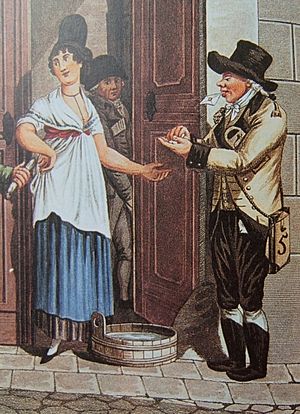Clapper Post facts for kids
The Clapper Post (called Klapperpost in German) was a special mail service that delivered letters and packages in cities. It started in Vienna, the capital city of Austria, in 1772. This unique postal service also existed in other cities across Austria.
Its name, "Clapper Post," comes from a special instrument called a clapper. This was a type of rattle that mailmen would strike to let people know they had arrived. Imagine hearing a distinct sound approaching your street, signaling that your mail was on its way! In Vienna, the Clapper Post operated for more than ten years, making it an important part of city life back then.
Contents
How the Clapper Post Worked
The main idea behind the Clapper Post was to make mail delivery faster and more noticeable within busy cities. Before this, people might not know when a mailman was nearby. The clapper changed that!
The Clapper Instrument
The clapper was a simple but effective tool. It was a wooden device that made a loud, distinct sound when shaken or struck. Mailmen would use it as they walked their routes. This sound would alert people in homes and businesses that the mailman was outside, ready to collect or deliver mail. This was especially helpful in a time before doorbells or widespread telephone use.
Mail Delivery in the 1700s
In the 1700s, getting mail was different from today. There were no cars or modern delivery trucks. Mailmen often walked their routes, carrying letters and small packages. The Clapper Post helped organize this process, making it more efficient for both the mail service and the people receiving mail. It showed how cities found clever ways to connect people through communication.
Clapper Post in Vienna
Vienna was the first city to use the Clapper Post, starting in 1772. It quickly became a well-known part of the city's daily life. The service helped connect people living in different parts of the city, making it easier to send news, business documents, and even money. Even though it only lasted for about ten years in Vienna, it was an interesting step in the history of postal services.
See also
 In Spanish: Klapperpost para niños
In Spanish: Klapperpost para niños
 | Victor J. Glover |
 | Yvonne Cagle |
 | Jeanette Epps |
 | Bernard A. Harris Jr. |




